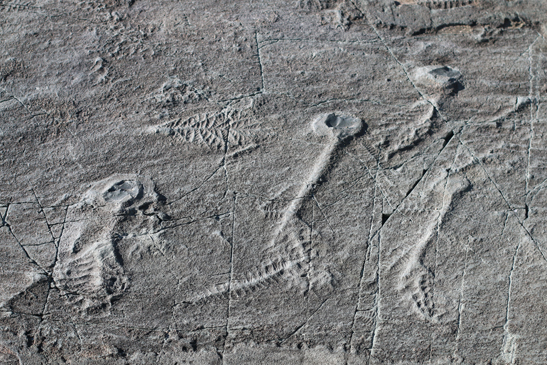We work on understanding how ecology impacts evolution through deep-time from the origins of animals to the present. The first animal communities are found in the Ediacaran time period, 580 million years ago. The oldest of these communities consisted of sessile benthic organisms that lived in the deep-sea. Therefore, to understand how macro-ecology has changed through deep-time, we study a wide range of different benthic communities from the fossil record and in the modern Antarctic and deep-sea. Using statistical and theoretical models we reconstruct how species interacted with each other and their environment and explore how these relationships influence macro-evolutionary patterns over the last 580 million years.
Current research topics include:
-
Ecology and evolution of of early animals
-
Marine ecology through deep-time
-
Antarctic ecology and ecosystem resilience
-
The evolution of life in the Universe
Key publications
Mitchell, EG, Kenchington, CG, Liu, G, CG, Harris, S and Wilby, PR. The relative influence of niche versus neutral processes on Ediacaran organisms. Ecology Letters https://doi.org/10.1111/ele.13383
Mitchell, EG, and Kenchington, CG. 2018 The utility of height for Ediacaran organisms, Nature Ecology & Evolution, 2(8),1218-1222. https://www.nature.com/articles/s41559-018-0591-6
Mitchell, EG., Whittle RJ, and Griffiths HJ. 2020 Benthic ecosystem cascade effects in Antarctica using Bayesian network inference. Communications biology 3: 1-7. https://www.nature.com/articles/s42003-020-01310-8
Mitchell, EG, Kenchington, CG, Liu, G, Matthews, JJ and Butterfield, NJ. 2015 Reconstructing the reproductive mode of an Ediacaran macro-organism. Nature (524) 343–346 https://www.nature.com/articles/nature14646
Mitchell EG, Whittle RJ, Griffiths HJ 2002. Benthic ecosystem cascade effects in Antarctica using Bayesian network inference. Nature Communications Biology. 3:582 https://www.nature.com/articles/s42003-020-01310-8
Hunter AW, Casenove D, Mayers C, Mitchell EG. 2020 Reconstructing the ecology of a Jurassic pseudoplanktonic raft colony. Royal Society Open Science. 2020 Jul 22;7(7):200142. https://royalsocietypublishing.org/doi/10.1098/rsos.200142
Mitchell EG, Bobkov N, Bykova N, Dhungana A, Kolesnikov AV, Hogarth IR, Liu AG, Mustill TM, Sozonov N, Rogov VI, Xiao S Grazhdankin DV. 2020 The influence of environmental setting on the community ecology of Ediacaran organisms. Interface Focus 10:4 https://royalsocietypublishing.org/doi/10.1098/rsfs.2019.0109

